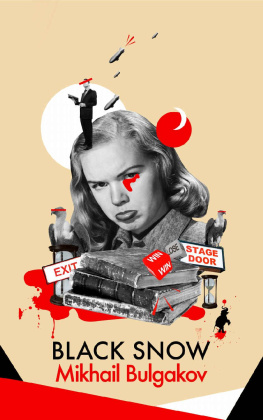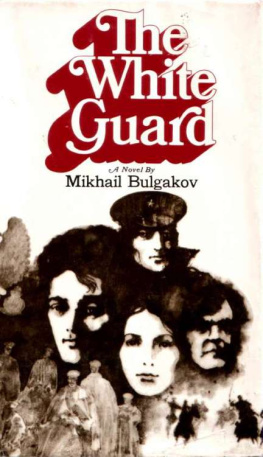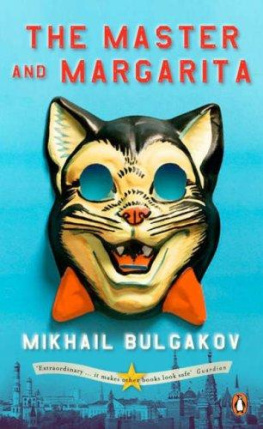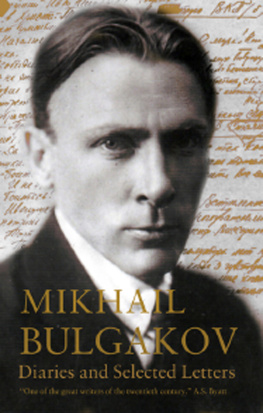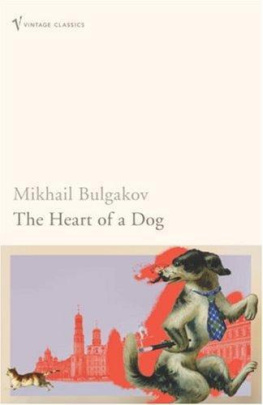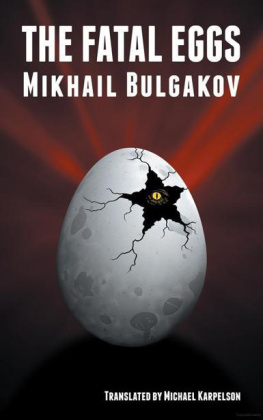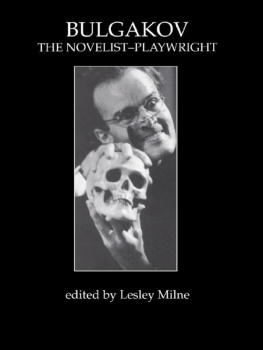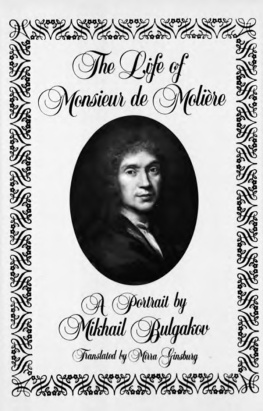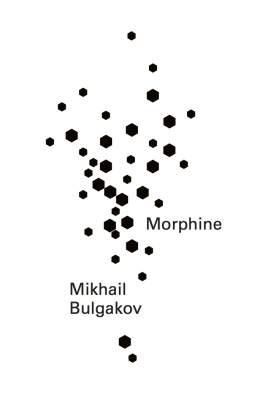Mikhail Bulgakov - Black Snow
Here you can read online Mikhail Bulgakov - Black Snow full text of the book (entire story) in english for free. Download pdf and epub, get meaning, cover and reviews about this ebook. year: 2016, publisher: Rosetta Books, genre: Detective and thriller. Description of the work, (preface) as well as reviews are available. Best literature library LitArk.com created for fans of good reading and offers a wide selection of genres:
Romance novel
Science fiction
Adventure
Detective
Science
History
Home and family
Prose
Art
Politics
Computer
Non-fiction
Religion
Business
Children
Humor
Choose a favorite category and find really read worthwhile books. Enjoy immersion in the world of imagination, feel the emotions of the characters or learn something new for yourself, make an fascinating discovery.
- Book:Black Snow
- Author:
- Publisher:Rosetta Books
- Genre:
- Year:2016
- Rating:5 / 5
- Favourites:Add to favourites
- Your mark:
- 100
- 1
- 2
- 3
- 4
- 5
Black Snow: summary, description and annotation
We offer to read an annotation, description, summary or preface (depends on what the author of the book "Black Snow" wrote himself). If you haven't found the necessary information about the book — write in the comments, we will try to find it.
Black Snow — read online for free the complete book (whole text) full work
Below is the text of the book, divided by pages. System saving the place of the last page read, allows you to conveniently read the book "Black Snow" online for free, without having to search again every time where you left off. Put a bookmark, and you can go to the page where you finished reading at any time.
Font size:
Interval:
Bookmark:
Black Snow
Mikhail Bulgakov
Black Snow first published in Russian in 1969. This translation first published by Alma Classics Ltd in 2014
by the Estate of Mikhail Bulgakov
Translation 2014 by Roger Cockrell
All rights reserved. No part of this book may be used or reproduced in any form or by any electronic or mechanical means, including information storage and retrieval systems, without permission in writing from the publisher, except by a reviewer who may quote brief passages in a review.
Electronic edition published 2015 by RosettaBooks
Cover design by Liam Madden
ISBN (EPUB): 9780795348273
ISBN (Kindle): 9780795348457
www.RosettaBooks.com
In July 1937 the Union of Soviet Writers wrote to Mikhail Bulgakov asking how his work on a play to commemorate the twentieth anniversary of the October Revolution was progressing. Bulgakov replied that to his great regret he had not been writing plays for more than a year now and appealed in turn to the Union for its support on two points as a matter of urgency: firstly, to help him to move to a new, more spacious apartment, since his present cramped circumstances prevented him from engaging in literary work; and secondly, to persuade the Directorate of Authors Rights to pay him the three thousand roubles owed to him in royalties (letter of 16th August, 1937).
Bulgakov had good reason to reply in such terms, for by this stage in his literary career he found himself in a very frustrating situation. At the beginning of 1936 every theatre in Moscow had withdrawn all the plays that he had written over the last few years. These included the Vakhtangov Theatre, which had stopped work on Alexander Pushkin; the Moscow Theatre of Satire, which had withdrawn his comedy Ivan Vasilyevich; and, most significantly of all, the Moscow Arts Theatre (MAT) which had banned Molire after just a few performances. This was a particularly crushing blow for Bulgakov since, in the figure of Molire, he had hoped to portray someone who, more than any other, would exemplify and illustrate the course of his own career.
Such is the background to the writing of Black Snow: A Theatrical Novel. Originally entitled Memoir of a Dead Man, the novels first draft was written within a remarkably short space of time in November 1936. But, for reasons that will become clear, it was never to be published during Bulgakovs life time. Although it is a relatively short, incomplete work, Black Snow possesses a narrative ambiguity that we find in earlier stories such as The Fatal Eggs and A Dogs Heart. In his framework introduction, Bulgakov (although not necessarily identical with the real-life Bulgakov) introduces the reader to a story in the form of notebooks which he has come across by chance. He is clearly keen to distance himself from what follows by disowning responsibility for it, and by disclaiming any idea that he has written a satirical story portraying a certain well-known Moscow theatre.
This seems a little strange. After all, if Bulgakov is not responsible for the story, why should he be so anxious about the existence, or non-existence, of a particular theatre? Those of Bulgakovs contemporaries who knew anything at all about the Moscow theatrical world would, however, very soon have realized that the theatre which features so prominently in the story was in fact none other than the MAT, and that its representation in disguised form therefore was merely a ploy on Bulgakovs part. At the same time, to further complicate matters, Bulgakov goes out of his way to assure the reader that the notebooks he is here presenting to his readers were written by someone quite unknown to him, a certain Sergei Leontyevich Maxudov. Yet once again many of Bulgakovs friends, relatives and colleagues would almost immediately have recognized Bulgakov himself in the figure of this supposed stranger.
To assume, however, that there is a direct one-to-one association between Maxudov and Bulgakov would be misleading. Maxudov is in effect a hybrid character, who seems to undergo a marked change in personality. In the early chapters he appears as a particularly wretched figure. As someone remarks in , You have something of Dostoevsky about you, havent you! And, indeed, in this first section of the story, the down-at-heel Maxudov, with his heightened consciousness and almost perverse sense of self-loathing, betrays more than a hint of Dostoevskys Underground Man. This is also reflected in the portrayal of his revolting, cell-like room with its divan and its protruding spring, and the generally unpleasant details of his life.
As the story proceeds, however, and as we follow the challenges and vicissitudes of Maxudovs burgeoning career as a writer, we see this pathetic, suicidal creature evolving almost imperceptibly into a more rounded, although not necessarily more sympathetic, character. The story that Maxudov now begins to tell traces some of the essential features of Bulgakovs own circumstances. True, the details are subtly changed, but again, anyone familiar with the details of Bulgakovs literary career would have recognized in Maxudovs account of the writing of his novel and its subsequent adaption for the stage a retelling of Bulgakovs own experience with his novel The White Guard and its recasting as The Days of the Turbins. The irony of this situation would not have been lost on Bulgakovs contemporaries and colleagues. For, in sharp contrast to Molire, The Days of the Turbins was performed successfully by the MAT many times, rapturously received by the general public and praised by Stalin himself.
We are presented therefore with a slightly unsettling alternative reality that characteristically intermingles fact and fiction. This is compounded by the depiction of individuals in Black Snow, who appear as fictional characters but who, more often than not, can be identified with real-life counterparts. Whereas some of these emerged after Bulgakovs death in a speculative list compiled by his third wife Yelena Sergeyevna Bulgakova and her son Sergei Shilovsky, many others would have been recognized with little difficulty (a full list of the characters with their real-life counterparts is given on in which Ivan Vasilyevich compels the actor Patrikeyev to cycle round the stage in an absurd attempt to demonstrate his feelings for the woman he loves.
The humorous impact of such episodes and of the many wickedly ironic character descriptions is obvious, and there are numerous accounts of the delighted reactions of Bulgakovs contemporaries whenever he read them excerpts from his novel. Yet Bulgakovs intention in writing Black Snow went further than simply to make people laugh. Through the novel he was able to vent his anger not only at his treatment by the MAT, but also at the treacherous attitude of the literary establishment towards him. Black Snow can therefore be seen as an act of personal revenge on a level that was at least comparable to the justifiable embitterment Bulgakov felt as the victim of Soviet bureaucracy, the arbitrary and inconsistent nature of the censorship and the machinations of the secret police. Bearing this in mind, it is a remarkable tribute to Bulgakovs unquenchable conviction that he should continue to be sustained by his affection for the theatre in general and his almost childlike sense of wonder at its magic.
Why did Bulgakov never complete Black Snow? There is no certain answer to this. In his commentary to the 2012 edition of the novel, Viktor Losev speculates that the reason was somehow connected with Bulgakovs unwillingness to elaborate on his attitude towards the Stanislavsky method. There may, however, have been another, more urgent, reason. Examination of Bulgakovs letters, together with the entries in Yelena Sergeyevnas diary during the second half of the 1930s indicates his increasing preoccupation with the writing of his new novel about the arrival of the devil in Moscow. While acknowledging that he was engaged on something that was completely pointless from a practical point of view, he was nonetheless tormented by the thought that he had to bring his literary career to a conclusion (letter to Vikenty Veresayev of 11th March 1939). Increasingly aware of his failing health and of the limited time available to him, Bulgakov was unable, it may be surmised, to complete
Next pageFont size:
Interval:
Bookmark:
Similar books «Black Snow»
Look at similar books to Black Snow. We have selected literature similar in name and meaning in the hope of providing readers with more options to find new, interesting, not yet read works.
Discussion, reviews of the book Black Snow and just readers' own opinions. Leave your comments, write what you think about the work, its meaning or the main characters. Specify what exactly you liked and what you didn't like, and why you think so.

